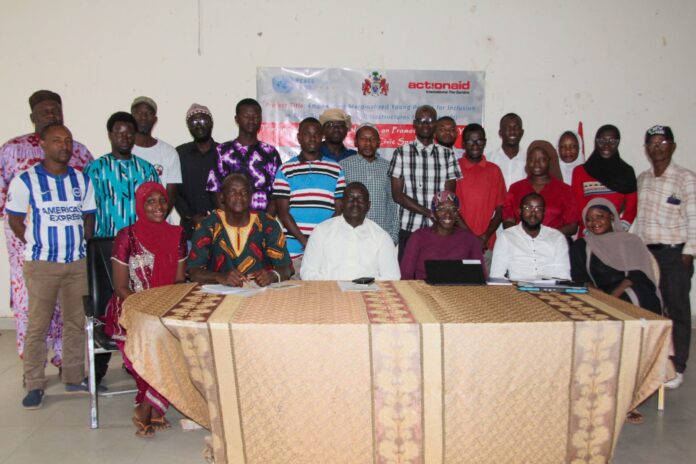By: Alieu Jallow
As part of its commitment to youth empowerment, ActionAid International The Gambia (AAITG) has commenced a three-day capacity-building training for journalists and bloggers. The initiative aims to promote the positive roles of young people in civic space and falls under the Empowering Marginalized Young People for Inclusion in Civic Space and Local Infrastructure for Peace (YPI) project, funded by the United Nations Peacebuilding Fund (UNPBF).
Speaking at the event, Amadou W. Jallow, Communications Coordinator at ActionAid International The Gambia, emphasized the importance of youth participation in governance and decision-making. He noted that sustainable development and inclusive governance can only be achieved when all citizens, particularly young people, are actively involved in decision-making structures.
“This training comes at a decisive moment when young people’s participation in governance has never been more important,” Jallow stated. “At ActionAid, we firmly believe that youth must be heard in national dialogues, policy formulation, and civic engagement. Journalists play a crucial role in ensuring that youth narratives are amplified.”
The YPI project aims to empower marginalized youth by equipping them with the skills, knowledge, and platforms necessary to engage in governance. It seeks to promote the inclusion of women, men, people living with HIV (PLHIV), and persons with disabilities (PwDs) in governance structures, including Village Development Committees (VDCs), Ward Development Committees (WDCs), and other civic bodies.
While acknowledging the Gambian government’s efforts in creating an enabling environment for youth participation, Jallow stressed that ensuring meaningful youth inclusion requires collaboration among civil society organizations, the media, and other stakeholders.
The training highlighted the role of journalists and bloggers in showcasing youth-led initiatives, uncovering barriers to youth participation, and holding decision-makers accountable. Jallow emphasized that a well-informed media sector strengthens democracy and ensures that young voices shape policies affecting their future.
“The role of journalists in this process cannot be overstated,” Jallow said. “Your platforms serve as powerful tools to share inspiring stories and advocate for youth inclusion.”
On his part, the Chairman of Mansa Konko Area Council, Landing B. Sonko, lauded the initiative, describing it as timely and significant. He also reflected on the challenges posed by migration, particularly in rural areas, and its impact on community development.
“If you go to some communities, particularly in the rural areas, it’s very disheartening. Sometimes, when there is a fire outbreak, it is difficult to contain because the able-bodied youth, who would typically assist, have migrated to urban centers or taken the ‘backway’ in search of greener pastures,” Sonko remarked.
He underscored the media’s critical role in shaping narratives by reporting on issues affecting and surrounding youth.
The training encouraged media professionals to use their platforms to foster a culture of peace, inclusion, and resilience. Participants were urged to continue reporting on youth issues with a focus on solutions, challenges, and policy interventions.




